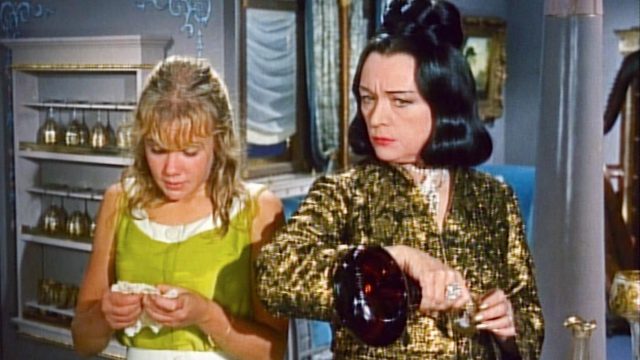I don’t think we’ve talked about anyone with as many lost films as Pola Negri. She was in the first-ever Polish feature film. Which is lost. She was in a movie wherein, per Wikipedia, she played “a dual supporting role as a nun and a cabaret singer.” Fascinated by that description? So am I! Too bad; it’s lost. A silent comedy featuring literally dozens of cameos of silent movie stars? Lost. Her only film directed by Raoul Walsh? Lost. A silent film with a soundtrack? Lost. I mean, this is a lot of lost movies, many of which sound deeply intriguing. You could almost write the entire history of lost film using Pola Negri movies.
Which makes me feel a little less bad that the only movie of hers I’m sure I’ve actually seen is the one she was pulled out of retirement for. It seems her retirement, at least in American film, involved three factors. First, she had been seriously involved with Rudolph Valentino for some years before his death, and there was a public perception that she’d used her grief over his death as a publicity stunt—not helped by the fact that she married someone else less than a year later. Second, the coming of sound meant that a woman with a thick Polish accent wasn’t as successful. And third, the Code meant that the vamp characters at which she excelled were no longer acceptable.
I mean, we’ll never know what was going on inside her relationship with Valentino. Both participants are long dead. Humans are complicated, and it’s entirely possible that she deeply loved him, thought being seen to grieve might help her career, and thought Serge Mdivani would help her heal or else also genuinely loved him. That can happen. And it’s definitely true that she’s one of the many women we’ve discussed and will continue to discuss whose career was damaged by the social requirements of the Code.
Her accent? Yeah, that was a thing, too. So much so that she went back to Europe. Naturally, this would turn out not to be the best choice she’d ever made. Hitler loved one of her movies so much that gossip soon turned it into “she had an affair with Hitler.” And she sued a French magazine for printing it and won, despite the magazine’s insistence that it wasn’t defamation. That idea would change, and Negri fled France when the Nazis took over. She only made two movies after that point—and refused any number of others for being derivative of the first of them.
Yes, the second is The Moonspinners. Which I love, and which I love her in. She’s delightful. She is, in the old way of phrasing things, No Better Than She Ought To Be—in short, she’s what might happen to those vamp characters some decades after the fact. It’s pretty explicit that her brief interaction with the plot has left her so bewildered that she’d just going to go get drunk now, thanks. Negri herself refused treatment for brain cancer at age ninety, and that feels in keeping with those roles as well—why put yourself through it? Do things your own way, even if that way is crusing around the Mediterranean with your pet cheetah.
I don’t have rich Hollywood friends who worry about my being broke; consider supporting my Patreon or Ko-fi!

